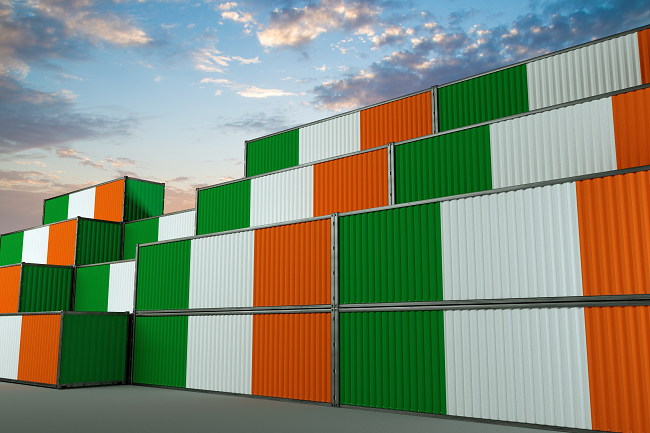
Exporters based in the Republic of Ireland had record sales in 2019 but are facing the “critical challenges” of Covid-19 and the UK’s end-of-transition-period this year, an Irish government body report has said.
A survey by Enterprise Ireland – the Irish state’s economic development agency focused on helping Irish-owned firms expand their exports – recorded a shift in emphasis to EU and North American markets in 2019.
Overall exports from Enterprise Ireland client companies rose 8% in 2019 to €25.6 bn, though the COVID-19 pandemic is expected to deliver a sharp sales decline in 2020.
UK trade surplus with Ireland
The UK is currently the single biggest market for Irish exports.
The trading relationship is strong in the other direction too: the Republic of Ireland is the UK’s fifth largest export destination, importing more from the UK than any other country.
According to the House of Commons Library (figures that are more widely sourced than those of Enterprise Ireland), UK exports to Ireland in 2018 were worth £35.1bn.
That same year, UK imports from Ireland were worth £21.6bn, resulting in a UK trade surplus of £13.5bn with the Irish Republic.
Irish fears of UK no-deal
Enterprise Ireland has actively encouraged its client firms to consider markets outside of Britain, amid concerns that the UK would end its transition from the EU with no free trade deal.
Client companies of Enterprise Ireland reported their highest-ever sales to the EU and North America in 2019. Exports to the EU jumped 15% to €5.6bn and by 16% to €4.7bn for North America. Sales to Asia Pacific increased 6% to €2.1bn.
Julie Sinnamon, CEO of Enterprise Ireland, said her agency had encouraged Irish exporters to reduce their dependence on the UK. "We have done a lot of work in terms of encouraging exports to the euro zone in particular and the result is 15% growth in 2019.”
She added that “Brexit is still coming down the line at a rate of knots, but the fact we’re down to 31% of sales from the UK, compared to 42% ten years, ago gives us a much better balance”.
Double challenge
However, the second half of 2020 would be “one of the most challenging [periods] facing Irish businesses in recent history,” Sinnamon said.
“Not only have many businesses been impacted by a significant reduction in customer demand from markets across the world due to COVID-19, but they are also facing the largest structural change to trading with the UK in over fifty years.”



